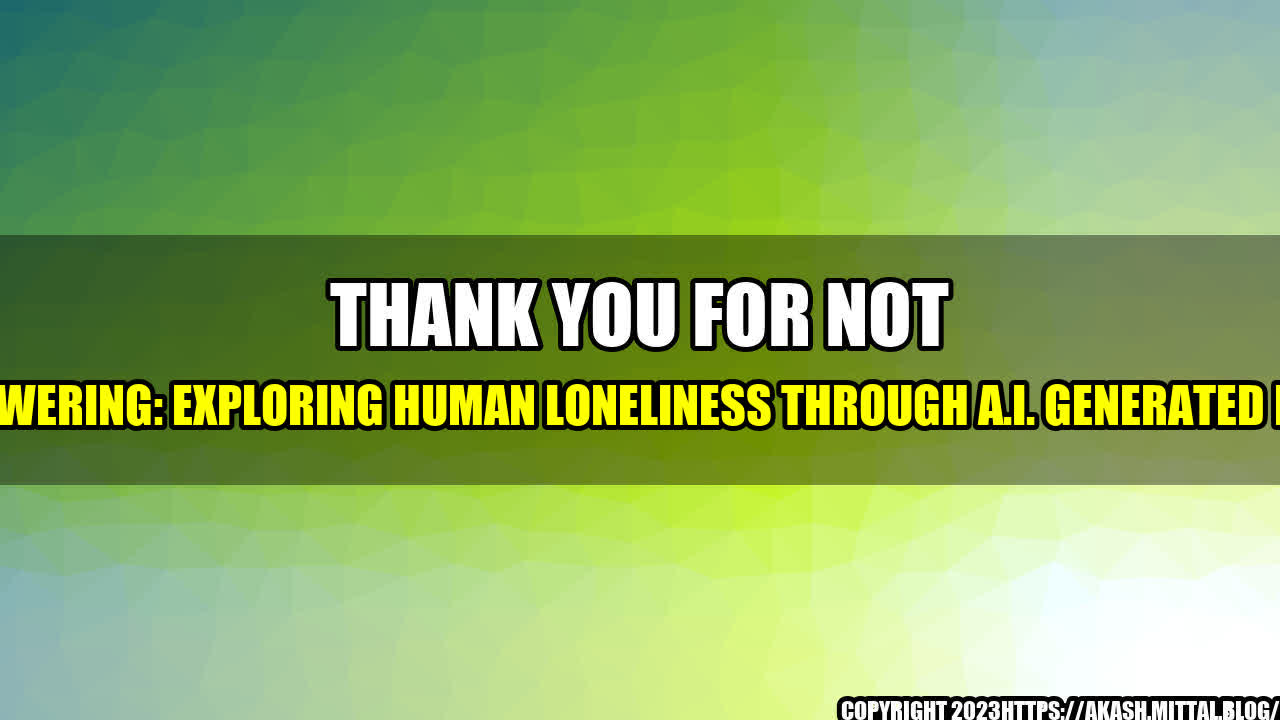It was a typical afternoon when I stumbled upon a short film titled "Thank You for Not Answering". The title caught my attention, so I clicked and began watching the beautifully crafted scenes of what appeared to be a man lost in the vastness of the world around him.
The film was created entirely by an artificial intelligence program, powered by deep learning algorithms that analyzed thousands of hours of cinematic footage to understand the nuances of storytelling. The result was a hauntingly beautiful expression of human loneliness in a world where we are more digitally connected than ever before.
As I continued to watch, I couldn't help but think of my own experiences with loneliness. I remembered the times when I would sit in a crowded room, surrounded by people, yet still feel completely alone.
Loneliness is a complex emotion that affects us all in different ways at different times in our lives. But what is it exactly, and why is it so prevalent in today's society? Let's explore these questions further.
What is Loneliness?
Loneliness is often described as a feeling of emptiness or disconnect from others. It's a universal human experience, but it can be hard to define because it presents differently for everyone. Some people feel lonely when they're physically alone, while others feel lonely in a crowd. Some people feel lonely because they lack social connections, while others feel lonely in the midst of a thriving social life.
One thing is for sure: loneliness is not the same as being alone. You can be alone and perfectly content, or you can be surrounded by people and still feel incredibly lonely. Loneliness is a subjective experience that is influenced by a multitude of factors, including social, psychological, and environmental factors.
How Prevalent is Loneliness?
Loneliness is becoming increasingly prevalent in today's society, and it's not just a problem for older adults. According to a study by the American Psychological Association, more than 60 million Americans reported feeling lonely in 2020, a number that has only increased with the COVID-19 pandemic. Young adults, in particular, are experiencing high rates of loneliness, and social media is often cited as a contributing factor.
The rise in loneliness is concerning because it is associated with a host of negative health outcomes, including depression, anxiety, and even physical health problems such as heart disease and stroke. As human beings, we are wired for social connection, and when we lack it, our overall well-being suffers.
What can we do to combat loneliness?
While loneliness can be a difficult emotion to deal with, there are steps we can take to combat it. Here are three practical tips:
- Cultivate meaningful relationships: While social media can help us stay connected, it's important to prioritize face-to-face interactions. Invest time in building meaningful relationships with people who share your interests and values. Join clubs or groups that align with your hobbies or passions, and take the time to nurture those connections.
- Create daily habits that promote well-being: Small lifestyle changes can have a big impact on our mental health. Engage in activities that bring you joy, such as exercise, meditation, or journaling. Set aside time for self-care every day, and prioritize getting enough sleep, eating a balanced diet, and staying hydrated.
- Seek support if you're struggling: If you're experiencing loneliness or other mental health concerns, don't hesitate to seek support. Talk to a trusted friend or family member, or consider reaching out to a mental health professional.
The Power of A.I. Generated Films
Returning to "Thank You for Not Answering," it's clear that the film's use of A.I. technology has added a new dimension to the conversation around loneliness. The film is a reminder that technology, when used for good, has the power to bring us together and help us better understand the nuances of the human experience.
As we continue to grapple with this complex emotion, it's important to remember that we're not alone in our struggles. Whether we find connection through face-to-face conversations, online communities, or through thought-provoking films like "Thank You for Not Answering" – we are all in this together.

Curated by Team Akash.Mittal.Blog
Share on Twitter Share on LinkedIn